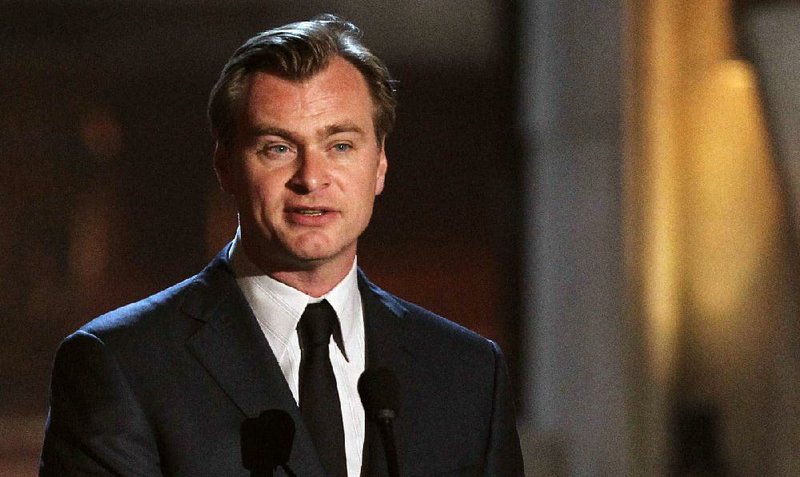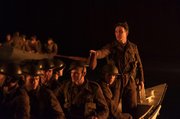BURBANK, Calif. -- It is a little surprising that World War II would grab the cinematic fancy of Christopher Nolan, given the dystopias, demimondes and dreamscapes that have sprung from his fertile mind.
He has conjured underworlds peopled by tattooed amnesiacs and broody superheroes; he has plunged audiences into Escherian dreams within dreams within dreams; he has tested their grasp of wormholes and gravitational singularity. The yoke of reality never seemed to be his thing.
But with his new movie, Dunkirk, Nolan ventures into the harsh world of a real war, which outwardly seems like well-worn terrain, except that he has never tackled anything like it before.
"It's the first time I've taken on any kind of real subject matter, any kind of historical truth, and that was very daunting," Nolan said. "I don't want to sound too precious about it at all, but, you know, I wanted to do something that frightened me a bit."
Nolan's film is about the astounding rescue of 338,000 Allied troops from the beaches of Dunkirk, France, in 1940. Hemmed in by German forces, the Allies were trapped as German aircraft strafed and bombed the sands, with the only way out being across the English Channel. Shallow waters prevented British destroyers from coming close to the beaches, so the call went out to private boat owners in England to help ferry the soldiers to safety.
A flotilla of hundreds of pleasure boats, barges, yachts, ferries and fishing boats set out, many piloted by civilians, and, under bombardment from the Luftwaffe, helped pull the rescue off. Had they not, the war could have taken a much different course.
"If Britain had surrendered, it effectively would have left Europe Nazified," said Joshua Levine, a historian and author who worked closely with Nolan on the script. "Barbarism and intolerance would have become the natural order of things."
The term "Dunkirk spirit" is carved into the British psyche and evokes people coming together in tough times. Yet as pivotal as the event was, it is often not well known in the United States, which did not enter the war until Dec. 7, 1941. Of the dozens of feature films made in recent decades about the war, none focused on Dunkirk (a British feature film about it was released in 1958 and a French film in 1964).
"As a filmmaker you're looking for gaps in the culture, pop culture at least; you're looking for things that haven't been addressed in movies," Nolan said, "And Dunkirk, for whatever reason, has never been addressed in modern cinema."
In person, Nolan, 46, exudes the intelligence and focus that inform his meticulously plotted films. He grew up in Chicago and London, but his accent, mien and look -- floppy schoolboy hair, trousers, blazer and Oxford button-down -- is British all the way.
His blistering success -- his nine films have pulled in billions of dollars -- has also meant that he is now an old hand at sit-down interviews. While he was not at all perfunctory in our chat, there was a faint air of, "Right, let's get on with things." He is also, not surprisingly, a rather serious man, and did not exhibit a shred of either the British tendency to self-deprecate or that Hollywood tic of trying to win over and charm.
Nolan did allow that the run-up to the release of Dunkirk had left him somewhat of a nervous wreck.
"It's terrifying, it's the worst, yeah, I hate it, I hate it," he said. "You make the film for an audience, you want to get it out there in the widest way possible, and the broadest way possible, but it never gets any easier."
Nolan seized on the idea for the film some 25 years ago, when he and his girlfriend at the time, the producer Emma Thomas (now his wife), joined a friend on a small sailing yacht for the journey from England across the English Channel to Dunkirk.
It was around Easter, and they expected a day trip, Nolan said, but the seas were incredibly rough, and the wind cruelly cold. It ended up taking a numbing 19 hours. "It was a very intense experience, and no one was dropping bombs on us," Nolan said. "I think that really planted the seeds for me."
He shelved the idea because he had a career to build. The release of his breakthrough film, Memento, (2001), was nearly a decade away. To do Dunkirk properly on a vast scale, Nolan needed lots of Hollywood money. "For British people, it's kind of sacred ground," he said. "You have to do it right."
Happily, his films, especially the Dark Knight trilogy, went on to make a boatload for Warner Bros., and a few years ago, the studio agreed to back Dunkirk.
"We felt now was the time to capitalize on that trust and relationship," said Thomas, who has been a producer on all of Nolan's feature films. "It very much felt like the sum of everything we've learned in prior movies."
On several fronts, Dunkirk breaks from form.
Its running time is just one hour and 47 minutes, which makes it an hour leaner than Interstellar, and Nolan's shortest film since Following, his 1998 feature debut. He wanted Dunkirk to be a tight, taut film that plunged into the action without preamble, like the third act of one of his previous films.
Nolan also did not want to make a typical war movie, and instead built it as a nail biter. To avoid alienating the audience, he also kept out nearly all traces of blood -- "it's not the button we wanted to push," he said -- landing a PG-13 rating even though, he said, the studio had given him the go-ahead to make an R-rated film.
"We wanted an intensity not based on horror or gore. It's an intensity based on rhythm, and accelerating tension, and overlapping suspense scenarios," he said. "Dunkirk to me is one of the most suspenseful ticking-clock scenarios of all time."
In preparation, Nolan spent a few days driving with Levine around England talking to veterans, although the characters he created were composites. Much of the production happened on the beaches of Dunkirk, with key cast members spending weeks training on the beaches and in the ocean.
The film entwines perspectives from people on land, in air and at sea, through the eyes of, among others, a naval officer (Kenneth Branagh), a civilian boat captain (Mark Rylance), a shellshocked officer (Cillian Murphy), Royal Air Force pilots (Tom Hardy and Jack Lowden), and the central character, a painfully young British soldier played by a relative newcomer, Fionn Whitehead.
There is something of an Everyman quality to Whitehead, and he said his greenness helped him land the part, because Nolan was seeking an actor whose uneasiness in a big-budget, star-studded film would translate to vulnerability onscreen. "It was very, very daunting," Whitehead said. "But he wanted someone who had to adapt quickly to a new situation, which is obviously evident with the soldier, and true to me."
The most talked about bit of casting was Nolan's hiring of pop star Harry Styles, of the boy band One Direction, for an ancillary part. Twitter erupted after Styles lopped off his flowing locks ("Haircut revealed!") and when images appeared of his character possibly drowning ("Our hearts can't take it!"). Nolan, a father of four, said he had been only dimly aware of Styles' fame and chose the singer entirely based on his acting chops. "He was really impressive," Nolan said.
As much as a departure as Dunkirk is for Nolan, it bears his signature hallmark of dancing around linearity and time. The film jumps forward a few hours or days, then back, and takes repeated runs at harrowing incidents from different vantages, as when Hardy's pilot desperately tries to ward off a German air attack, or when soldiers frantically swim from spilled oil that is about to ignite.
The effect is impressionistic, almost painterly, with each new shot a brush stroke that fills in the picture, but also a little disorienting. "It's, 'We know you're as clever as us, and we know you can keep up,'" said Murphy, who has worked with Nolan twice before.
MovieStyle on 07/28/2017

